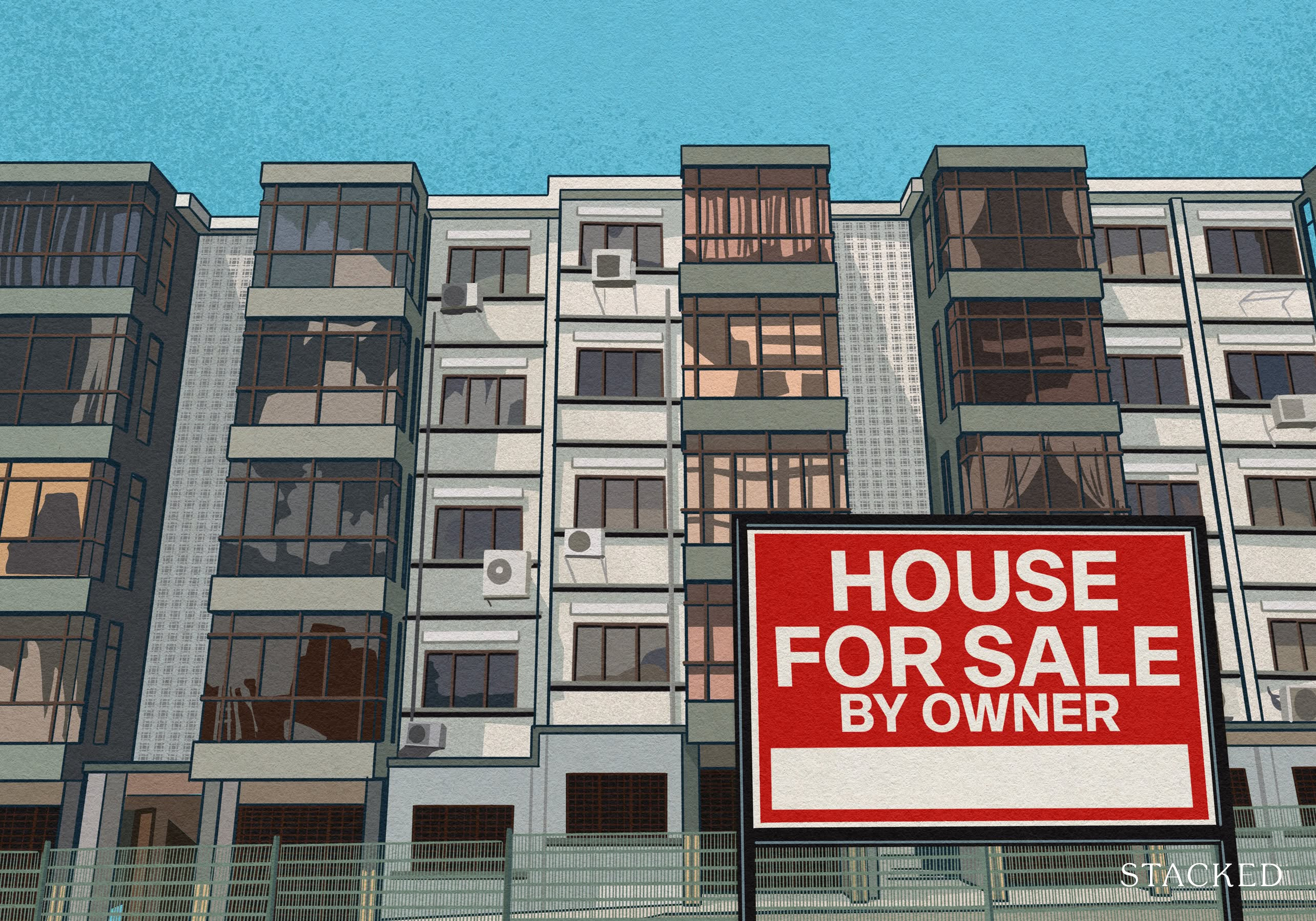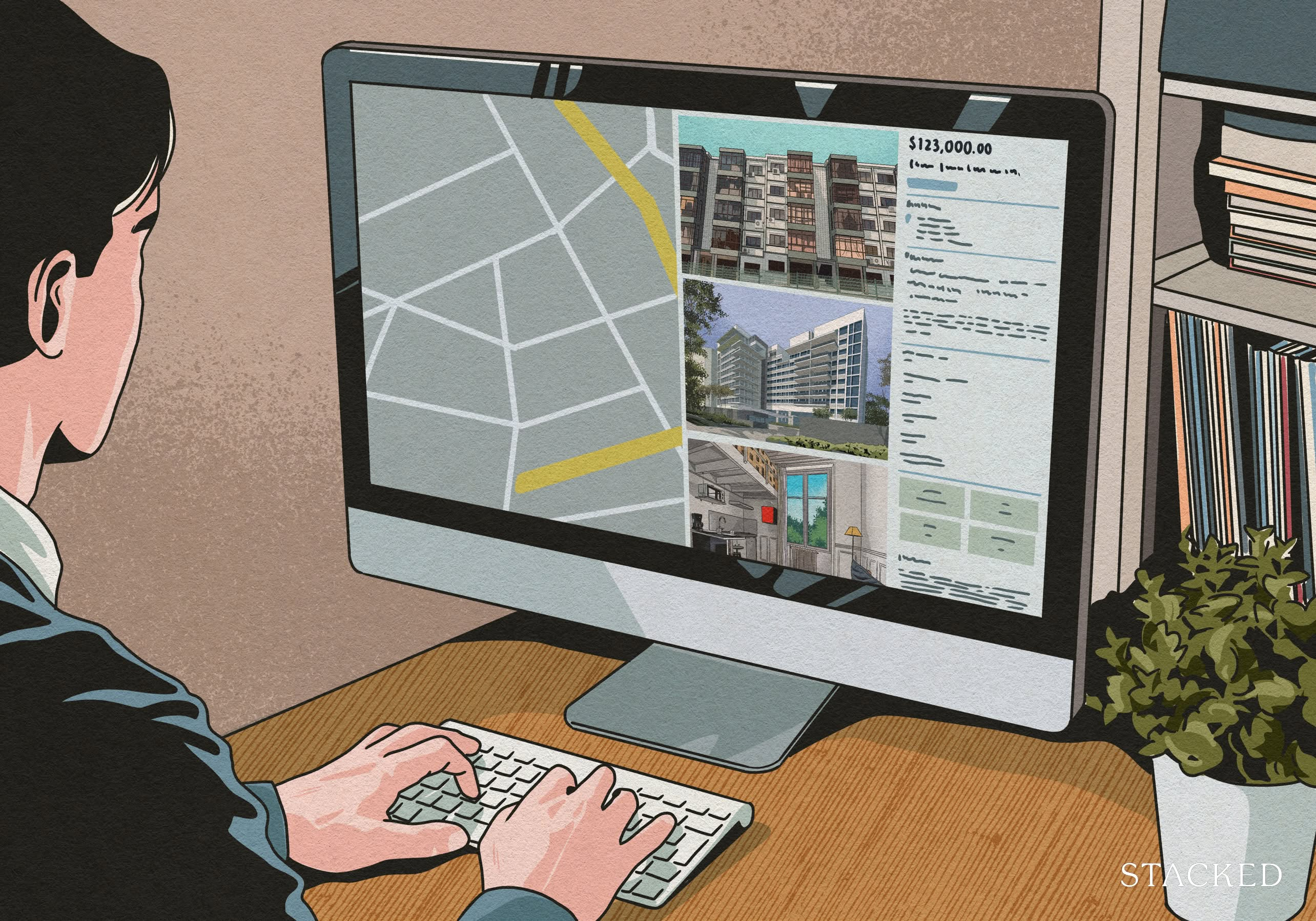Should You Sell Your Own Home In Singapore? 7 Key Factors To Consider Before You Try
January 22, 2025

It can be tempting to try and sell your own home in Singapore. Skipping the property agent means you can save the usual two per cent commission, which, on higher-priced properties, can add up to a significant amount. However, in reality, the majority of property sales still go through agents. The reason is simple: not everyone has the time or flexibility to manage the sale on their own. For those who do manage to pull it off, there are certain traits they often share:
Who has the best chance of getting a good property deal without an agent?
For the most part, successful DIY sellers (i.e., those who not only sell their home, but manage to get a good price) tend to have:
- 1. Already interested buyers, and don’t have to list
- 2. Flexible hours or Work From Home arrangements
- 3. Time for screening calls/inquiries
- 4. Family members who are on hand to help
- 5. Trending properties that “sell themselves”
- 6. A lot of time in which to sell
- 7. A love for interaction and negotiation
1. Already interested buyers, and don’t have to list
The toughest part of selling a property isn’t usually the timeline or paperwork—although those can be complex in their own right. The real challenge lies in finding the right buyer. For instance, you can’t list your property on the largest property portals unless you’re a registered agent. At present, only the HDB resale portal (for HDB properties) and a few smaller platforms allow individuals to list their properties on their own.

If you can bypass the need to market and list your property, your chances of completing a DIY transaction improve significantly. In many cases we’ve encountered, this involves selling to family members—such as when children purchase the property, with an agreed price. We’ve also seen situations where tenants buy units directly from landlords or where co-living operators approach property owners.
In these cases, the bulk of the work lies in the transaction process, which you can navigate with the help of a law firm if needed. Without the need for a property agent, you can go straight into the transaction, avoiding the wait for other offers or dealing with endless calls and screenings.
That said, it’s important to tread carefully when selling to family members or close friends. If anything goes wrong with the property or the transaction, the blame game can quickly sour relationships and create lasting tension.
2. Flexible hours or Work From Home arrangements
Many sellers underestimate how awkward timing issues can become, particularly when it comes to viewings. Buyers will almost always want to visit a property multiple times to get a feel for things like noise levels and how the environment changes at different times of the day. For instance, they may visit once on a weekday and again on a weekend, or once in the afternoon and once around peak hours, such as 7 p.m. when everyone is rushing home.

You’ll need to be available to tidy up before viewings and, of course, to show the property and surrounding facilities. If you’re working a standard office job, there’s a good chance you’ll end up annoying your boss or clients by having to repeatedly leave at odd hours. It only gets trickier if you have multiple buyers to accommodate.
This makes DIY selling much easier if you have flexible hours or already work from home. If you must go without an agent, consider negotiating for more remote working days just for the duration of the sale process.
3. Time for screening calls/inquiries
A significant part of a realtor’s job often involves screening calls. As a seller, you’ll likely receive numerous unrelated inquiries—such as other sellers checking your price to gauge their own, or owners curious about asking prices and how different layouts compare. Some may even waste your time by requesting viewings, so you’ll need to get comfortable with screening these calls.
Another concern is potential scammers. We’ve heard stories of so-called “interested buyers” who collect details like addresses, ask for photographs, and then use this information for fake rental or sale listings.
To screen out these inquiries, you can use some of the same methods that agents rely on—such as asking if the buyer has already secured the HLE letter (for HDB flats) or in-principle approval from a bank. Ultimately, you’ll need to be prepared to take calls and engage in numerous conversations with strangers. If this interferes with your work or feels draining, a DIY sale could quickly become an unpleasant experience.
4. Family members who are on hand to help
From our experience, DIY selling works best as a family effort. It’s much more manageable if your spouse, parents, grown children, or others can assist with viewings when you’re occupied or help respond to calls and emails. You can’t be everywhere at once, and if you’re not keeping track of every potential buyer, you risk missing key details. It’s helpful to have the most detail-oriented family member track the various offers and conversations.
Another important reason is simply having someone available to take calls. Sometimes, you may be in a meeting or busy with work, and you don’t want to miss out on any potential offers just because you’re unavailable.
5. Trending properties that “sell themselves”
If you’re very lucky, your property may be in such high demand that you barely need to list it. We saw this happen frequently during the post-COVID housing crunch, when agents were slipping flyers into gates and cold-calling owners to ask if they were willing to sell. However, this can also occur if you have a unique or scarce unit type, such as premium loft units, those with an extra study, or very new resale flats that are barely five years old.

Buyers’ agents are always on the lookout for listings across multiple portals. So, with high-demand units, you can expect to be noticed, even if you use a smaller portal or rely on word-of-mouth.
While this doesn’t spare you from having to screen calls, conduct viewings, or negotiate, it does eliminate the risk of going months without an offer—an important factor if you need to sell quickly.
6. A lot of time in which to sell
In urgent situations, such as needing to sell within six months for ABSD remission, DIY transactions are almost always a bad idea. Unless you’ve already secured a buyer (as mentioned above), it can be tough to sell at a fair—or even a good—price with such a short holding period. This is especially true for higher-quantum units, such as rare jumbo flats or properties in prime regions.
This is where DIY selling can impact your timeline. Since you’re likely to take longer to sell than a property agent would, you may want to reconsider buying a new home before selling your current one. This strategy can help you avoid rushing for ABSD remission or being saddled with two home loans at once—one for your old home (if you still have a mortgage) and one for your new home.
Typically, the sales process involves setting a starting price and then trimming it every month or two, depending on the volume of responses. However, if you’re going the DIY route and can’t list on a major property portal, you may need to extend this time frame. Some DIY sellers have had to wait three or four months before receiving a single decent offer.
But if you’re not in a rush to sell, this isn’t a major concern. It also means that buyers who are able to sell their current home first, rent in the meantime, and wait while finding a new home are better positioned to handle the DIY selling process.
7. A love for interaction and negotiation
You’ll be speaking to a lot of buyers—and even more buyers’ agents. Keep in mind that the latter are industry professionals and trained negotiators. They’ll come armed with facts, figures, and persuasive anecdotes designed to wear you down. Aside from agents, you’ll also encounter buyers trying to lowball you (often with HDB flats, due to the ethnic quota), or people making blunt, rude comments about your home’s condition.

If you thrive on this kind of back-and-forth interaction, you may even enjoy the selling process. Those of you already working in sales will have an advantage, as you’re familiar with techniques like objection handling and price anchoring.
However, if this sort of interaction isn’t your thing, or if you find it emotionally draining, a DIY sale might not be right for you. You’ll be dealing with numerous people, and you may find yourself burning weekends or off-hours to keep up.
Whether you choose to sell on your own or not, you can follow us on Stacked for the data and information to help. Feel free to reach out to us with any queries too.
At Stacked, we like to look beyond the headlines and surface-level numbers, and focus on how things play out in the real world.
If you’d like to discuss how this applies to your own circumstances, you can reach out for a one-to-one consultation here.
And if you simply have a question or want to share a thought, feel free to write to us at stories@stackedhomes.com — we read every message.
Ryan J. Ong
A seasoned content strategist with over 17 years in the real estate and financial journalism sectors, Ryan has built a reputation for transforming complex industry jargon into accessible knowledge. With a track record of writing and editing for leading financial platforms and publications, Ryan's expertise has been recognised across various media outlets. His role as a former content editor for 99.co and a co-host for CNA 938's Open House programme underscores his commitment to providing valuable insights into the property market.Need help with a property decision?
Speak to our team →Read next from Property Advice

Property Advice We Can Buy Two HDBs Today — Is Waiting For An EC A Mistake?

Property Advice I’m 55, Have No Income, And Own A Fully Paid HDB Flat—Can I Still Buy Another One Before Selling?

Property Advice We’re Upgrading From A 5-Room HDB On A Single Income At 43 — Which Condo Is Safer?

Property Advice We’re In Our 50s And Own An Ageing Leasehold Condo And HDB Flat: Is Keeping Both A Mistake?
Latest Posts

Pro River Modern Starts From $1.548M For A Two-Bedder — How Its Pricing Compares In River Valley

New Launch Condo Reviews River Modern Condo Review: A River-facing New Launch with Direct Access to Great World MRT Station

On The Market Here Are The Cheapest 5-Room HDB Flats Near An MRT You Can Still Buy From $550K



































1 Comments
Does stacked help to advertise and sell commercial property too?